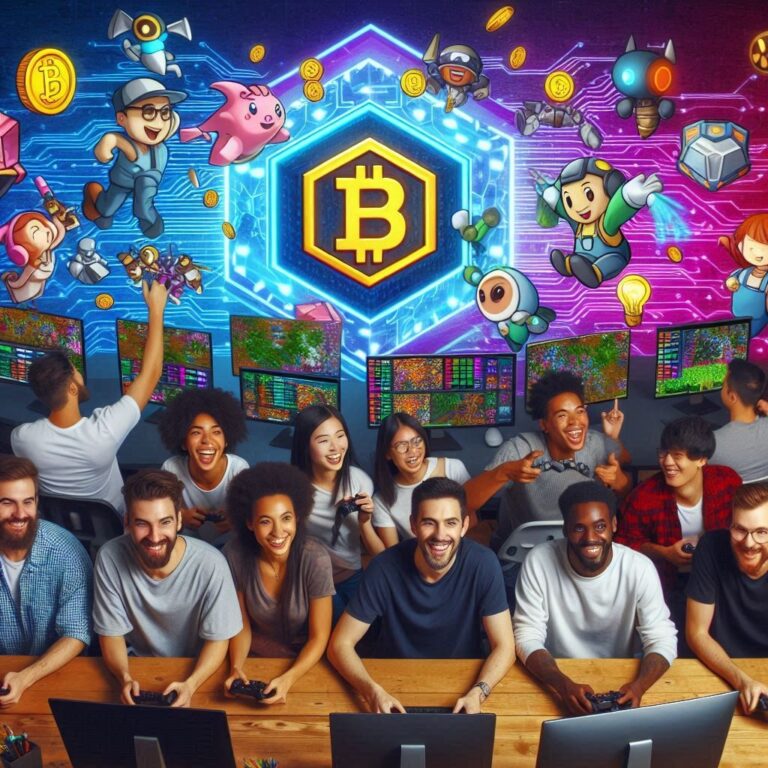Introduction
Blockchain technology is transforming the gaming sector and starting a new period of digital engagement and economic possibility. Initially seen as a merely entertainment-driven industry, gaming has developed into a vibrant ecosystem where users may earn, sell, and even own digital assets in unheard-of ways. This metamorphosis marks a fundamental change in how games are created, played, and sold, not just a fad.
Blockchain gaming lets players participate in distributed economies that enable them to own their in-game assets. Gamers may purchase, sell, and trade original digital goods—such as skins, characters, and virtual real estate—using non-fungible tokens (NFTs), generating real-world value from their gaming experiences. This change improves player involvement and creates fresh income sources for developers, who gain from creative monetising techniques.
Blockchain technology also guarantees security and openness in exchanges, safeguarding participants’ assets. Blockchain gaming is obviously here to stay as the gaming scene changes. It will open doors for a more inclusive and fulfilling experience for creators as well as players. Blockchain is leading the fascinating change that marks the bright future of gaming.
Recognising Blockchain Games
Blockchain gaming incorporates blockchain technology into video games, allowing distributed control over in-game assets, transactions, and economies. Blockchain games use distributed ledgers, unlike conventional gaming, where goods and currencies are kept on centralised servers under the control of game producers. Therefore, blockchain games guarantee actual ownership of digital assets. Assets may be bought, sold, and traded safely by players free from loss should game closures or policy changes affect them.
The Value of Decentralisation for Games
Blockchain gaming focuses on decentralization, which offers the following benefits:
- Blockchain-based games let users own in-game objects as NFTs or non-fungible tokens. These assets are exchanged or moved across many platforms and kept on a blockchain.
- Interoperability allows players to use their assets across many games or platforms, strengthening the linked gaming ecosystem.
- Blockchain’s immutability helps participants protect their assets and transactions against data loss, fraud, or hacking.
- Smart contracts automate in-game mechanics and economic models, guaranteeing openness and fairness.
- Gaming is a possible revenue source as players earn real-world value and cryptocurrencies by employing gaming activities.
Blockchain Gaming Drives Distinct Economies

Blockchain gaming advances distributed economies where players, creators, and investors cooperate in a self-sustaining financial environment, transcending mere entertainment. It works like this:
1. P2E Model, Play-to- Earn
The play-to-earn approach of blockchain gaming is among the most fascinating features. P2E lets users earn cryptocurrencies, NFTs, or other valuable assets by playing games, unlike conventional games, where players spend money on in-game purchases without any rewards. Games like Axie Infinity and The Sandbox have shown P2E’s promise by letting users make money from their gaming abilities.
2. Tokenised In-Game Economies
Blockchain games run native cryptocurrencies or tokens as in-game money. The real-world worth of these tokens allows participants financial incentives, as they can be traded for fiat money. They also fit staking, governance, or unlocking premium features.
3. Markets with Decentralised Distribution
NFT markets let users exchange their in-game assets free from middlemen’s limitations. Unlike conventional game shops, where creators take a significant share, blockchain-based markets provide equitable economic possibilities. Rare skins, weapons, or characters players sell for Bitcoin create a player-driven economy.
4. Automated Transactions: Smart Contracts
Smart contracts are self-executing agreements with pre-defined guidelines running free from human involvement. Blockchain gaming guarantees openness and lowers fraud risks by automating reward distribution, trading, and in-game dynamics.
5. Administration using DAOs
Decentralised Autonomous Organisations (DAOs) let gamers influence economic policy and game creation. By owning governance tokens, players may vote on choices about game updates, prize distributions, or ecosystem changes, generating a community-driven approach.
Rising Blockchain Games Changing the Sector
Several blockchain-based games are foreshadowing distributed economies’ future:
- Players of P2E Axie Infinity create, fight, and trade Axies (NFT monsters) for prizes.
- Users of the virtual reality Decentraland purchase, sell, and construct virtual real estate.
- Users of a metaverse game called The Sandbox may create, own, and profit from virtual assets.
- A blockchain-based trading card game, Gods Unchained offers actual digital card ownership.
- Illuvium: Blockchain-based gameplay and NFT open-world RPG game
Challenges and Blockchain Gaming’s Future
Although exciting, blockchain gaming presents many difficulties. User adoption is a key obstacle; complexity in onboarding and the need for crypto expertise create hurdles for regular players.
Additionally, lousy gameplay and a dearth of interesting material contribute to consumer hesitation. High transaction fees and scalability problems can aggravate gamers even more. Still, there are false ideas about blockchain games causing environmental damage and fraud.
Further challenges arise from regulatory ambiguity and the early stage of blockchain game development. Overcoming these obstacles is vital; the future of blockchain gaming depends on bettering user experience, tackling scalability, and promoting a closer knowledge of its advantages.
Regulatory Uncertainty:
- Policies regarding crypto-based gaming are currently under definition by governments.
- Many conventional players are not aware of the ideas of blockchain and bitcoin.
- While blockchain improves security, bright contract flaws and frauds still exist.
Notwithstanding these obstacles, blockchain gaming seems to have a bright future. With developments in Layer 2 scaling solutions, better rules, and more general acceptance, blockchain gaming is ready to completely transform the sector even further.
Conclusion
Blockchain gaming is changing the operational dynamics of companies in the sector and the gaming experience. Blockchain enables participants—gamers and developers alike—to construct and investigate creative economic models by combining decentralisation, actual ownership of goods, and financial incentives. This new paradigm radically changes how players engage with games and one another by letting them actually benefit from their gaming.
We could expect even more imaginative and engaging gaming experiences to redefine the digital economy as the technology develops. The play-to best shows this change-earn model, which lets gamers make money while still loving their preferred games. Furthermore improving security and openness in transactions, blockchain technology builds consumer confidence.
Blockchain gaming offers a massive universe of possibilities that should be investigated regardless of your interests—gaming, investment, or development. This industry promises to provide hitherto unheard-of chances for creativity and cooperation as it develops; hence, it is an interesting moment to be engaged in the junction of blockchain technology and gaming. The future presents almost endless opportunities for those willing to welcome this transforming shift.

